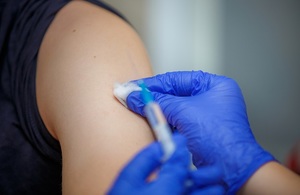Government asks regulator to approve supply of Oxford/AstraZeneca vaccine
The government has formally asked the Medicines and Healthcare products Regulatory Agency to evaluate whether supply of Oxford/AstraZeneca vaccine can be authorised.

- Government requests medicines regulator evaluate whether supply of Oxford/AstraZeneca vaccine can be authorised
- Vaccine must first meet the UK’s high standards of safety, efficacy and quality
- Move would mean potentially faster access to the vaccine for UK patients, if approved
The government has formally requested the UK’s independent medicines regulator assess the suitability of Oxford/AstraZeneca’s COVID-19 vaccine for temporary supply, as soon as the company submits the necessary safety, quality and efficacy data.
The move marks a significant first step in getting the vaccine approved for deployment, should it meet the regulator’s requirements.
The UK will be one of the first countries in the world to receive the vaccine, if authorised, with AstraZeneca expecting to have up to 4 million doses ready for the UK by the end of the year and 40 million by the end of March 2021.
The UK is the first country in the world to sign an agreement with Oxford University/AstraZeneca, securing access to 100 million doses of the vaccine
Earlier this week, the University of Oxford and AstraZeneca published their interim efficacy results, which indicated the vaccine was at least 70% effective in protecting individuals from COVID-19.
This rose to 90% effective when administered as half a dose, followed by a full dose – rather than 2 full doses.
Health and Social Care Secretary Matt Hancock said:
We are working tirelessly to be in the best possible position to deploy a vaccine as soon as one is approved by the independent regulator, the MHRA.
We have formally asked the regulator to assess the Oxford/AstraZeneca vaccine, to understand the data and determine whether it meets rigorous safety standards. This letter is an important step towards deploying a vaccine as quickly as safely possible.
In a letter sent by the Department of Health and Social Care to the Medicines and Healthcare products Regulatory Agency (MHRA), the government has asked the regulator to assess the vaccine for authorisation under Regulation 174 of the Human Medicines Regulations, which enables the temporary supply of medicines to be authorised in response to a public health need.
The MHRA has already started a rolling review to determine whether the Oxford/AstraZeneca vaccine meets its strict standards of safety, efficacy and quality.
Once the MHRA receives the full data from the company, its renowned team of scientists and clinicians stand ready to progress its assessment of the vaccine.
Until the end of December, and as part of the transition period, vaccines must be authorised via the European Medicines Agency and that authorisation will automatically be valid in the UK.
However, if a suitable COVID-19 vaccine candidate, with strong supporting evidence of safety, quality and effectiveness from clinical trials becomes available before the end of the transition period, EU legislation which we have implemented – Regulation 174 – allows the MHRA to temporarily authorise the supply of a medicine or vaccine, based on public health need.
The letter, signed by Deputy Chief Medical Officer for England Professor Jonathan Van-Tam and Director for COVID-19 Vaccine Deployment Antonia Williams, requests the MHRA’s Chief Executive Dr June Raine for the MHRA to evaluate whether the vaccine can be authorised under this regulation.
The government has already formally asked the MHRA to assess the Pfizer/BioNTech vaccine for its suitability for authorisation under Regulation 174.
Until a vaccine is approved, the public must continue to take necessary actions to keep themselves and their loved ones safe including by following the ‘Hands. Face. Space’ guidance and other public health advice.
Background information
Medical countermeasures such as effective therapeutics and vaccines could eventually make COVID-19 a more manageable disease, reducing its impact on society and the NHS so we can begin to get back to normal.
The MHRA is the UK’s independent regulator, globally recognised for requiring the highest standards for quality, safety and effectiveness.
After the transition period ends in January 2021, the MHRA will have new powers to approve medicines, including vaccines, and will have greater flexibility to do this in a shorter time, while maintaining the highest standards of safety, quality and effectiveness.
The Joint Committee on Vaccination and Immunisation (JCVI) are the independent experts who advise the government on which vaccines the UK should use and provide advice on who should be offered the vaccination first. The committee’s interim advice is that a COVID-19 vaccine should first be given to care home residents and staff, followed by people over 80 and health and social workers, then to the rest of the population in order of age and risk.
Vaccination will be managed by the health services in each nation: NHS England and NHS Improvement, NHS Wales, NHS Scotland, and Health and Social Care Northern Ireland.
The government has previously announced funding for the Oxford University/AstraZeneca vaccine including:
- £2.6 million announced on 23 March 2020
- £20 million announced on 21 April 2020
- £65.5 million announced on 17 May 2020
Through the government’s Vaccines Taskforce, the UK has secured early access to 355 million doses of 7 of the most promising vaccine candidates, including:
- Pfizer/BioNTech for 40 million doses
- Oxford/AstraZeneca for 100 million doses
- Moderna for 5 million doses
- GlaxoSmithKline and Sanofi Pasteur for 60 million doses
- Novavax for 60 million doses
- Janssen for 30 million doses
- Valneva for 60 million doses